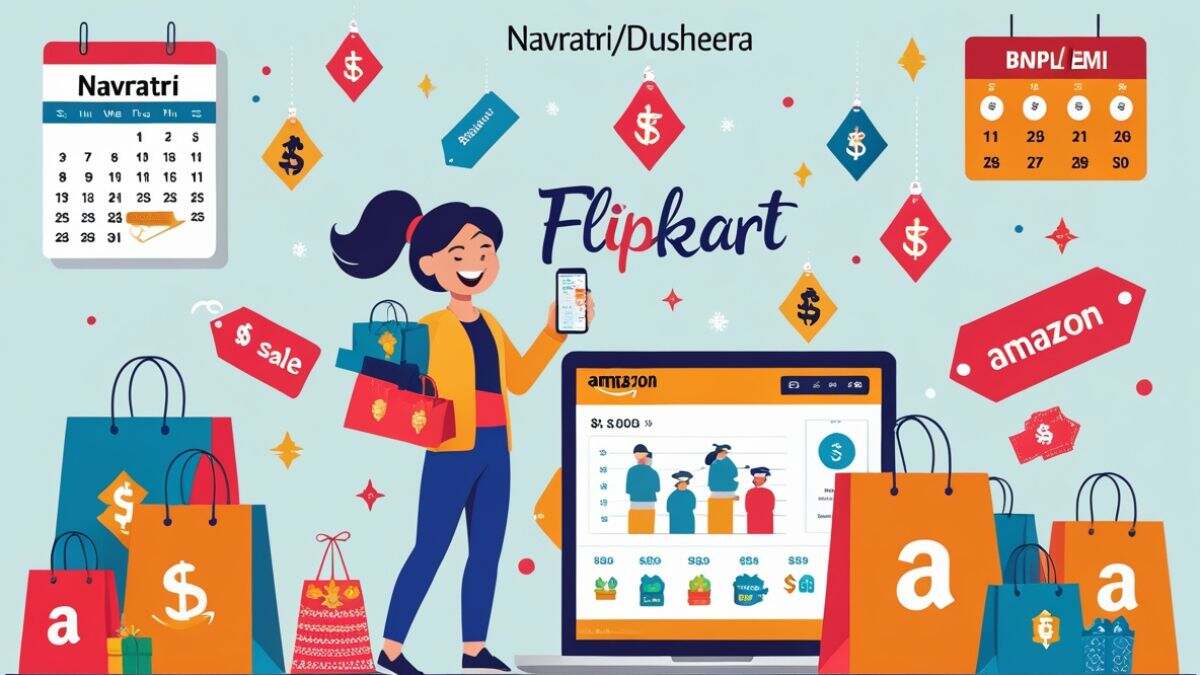Festive shopping binge fueled by alluring loan offers and discounts, but to prevent financial stress and debt traps, prioritize requirements, spend sensibly, and keep a healthy EMI-to-income ratio.
Smart Spending This Festival
E-commerce companies have already begun their festival season deals as the holiday season approaches, with Navratri and Dusheera in full force. Flipkart’s Big Billion Days sale and Amazon’s Great Indian Festival are now underway, providing a large selection of goods at steep discounts. It is the ideal time to purchase without going over budget, especially with the new GST reductions.
Enticing loan offers, Buy Now Pay Later (BNPL) plans, and Equated Monthly Instalment (EMI) alternatives from banks, non-banking financial companies (NBFCs), and fintech lenders are what fuel the holiday buying frenzy.
To prevent overspending and financial strain, it is crucial to approach these sales with a prudent spending plan.
Prioritize Needs Over Wants
Here are some suggestions to help you manage your money while taking advantage of the holiday deals.
Set necessities first and manage your money well.
Impulsive purchases might result from the lure of discounts during sales, which can make it difficult to distinguish between requirements and desires. The CEO and co-founder of Credgenics, a platform for debt collection and resolution for banks, NBFCs, and fintechs, Rishabh Goel, stresses the need of differentiating between necessary and discretionary spending.
Prioritize high-priority purchases above luxury goods like expensive technology, such as educational resources, urgent home necessities, or significant trips.
Budget Wisely, Avoid Debt
To limit spending and prevent taking on more debt than one can afford, it is essential to have a clear understanding of how much to spend on what. The co-founder of CashKaro, an app that offers cashback and discount coupons, Rohan Bhargava, agrees, recommending users to “establish precise, category-wise budgets” and use budgeting applications to monitor their spending in real time.
Customers may enjoy the holiday season without getting into needless debt by putting their necessities first and staying within a clear budget.
Automate repayments and keep the EMI-to-income ratio within a reasonable range.
Manage EMIs, Stay Disciplined
Goel advises limiting overall EMI payments to 30 to 40 percent of monthly income in order to protect financial wellness. By allowing for savings and unforeseen costs, this ratio lowers the possibility of late payments, which might lower credit ratings.
Another good way to reduce the possibility of late payments and maintain financial discipline is to use auto-debit systems to automate EMI installments. Bhargava stresses how simple it is to sign up for BNPL and free EMI plans, but cautions that doing so may “extend financial responsibilities into the next year.”
Do not take out more than one loan, and carefully review the conditions.
The thrill of the season often tempts shoppers to take out many loans, but Goel cautions against this as managing multiple EMIs may put a burden on finances.
Read Loan Terms Carefully
To prevent surprises, it is also essential to carefully go over the loan details, including interest rates, hidden costs, and penalties. Over an extended period of time, an apparently low EMI might be hiding large interest expenses, thus increasing the debt load.
Bhargava reaffirms this, telling customers to “be wary of the debt trap” and see their spending over the holidays as a rigid cap. Customers may make well-informed selections that support their financial objectives by avoiding the temptation to take out several loans and carefully reviewing the conditions of each one.
Smart Savings with Discounts
Bhargava advises using cashback platforms in addition to disciplined borrowing to take advantage of platform and bank promotions. He says that in order to maximize their Christmas purchases, astute consumers are combining bank incentives, platform promotions, and cashbacks.
He emphasizes the significance of just spending what one can afford today, but warns against using FOMO, or the fear of missing out, to influence purchases.
Customers may maximize value without jeopardizing their financial security by combining prudent budgeting with the judicious use of discounts and cashbacks.

